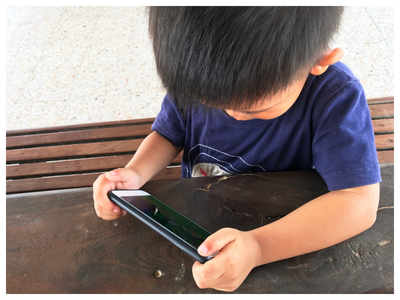- News
- lifestyle
- parenting
- toddler-year-and-beyond
- This is how watching TV for more than two hours will impact your child's behaviour
Trending
This story is from August 19, 2019
This is how watching TV for more than two hours will impact your child's behaviour
The lead author of the study said that impulsive behaviour is associated with numerous mental health and addiction problems, including eating disorders, behavioural addictions and substance abuse.

If you are a parent of a young child, you surely would have asked experts or Googled how much screen time is okay for your growing child. Most parents are guilty of using gadgets to distract their little ones, especially during meal times or while they are dining out. But how much is too much?
And what if their addiction to screen is affecting their decision making? Well, a new study claims that impulsive behaviour in children is linked to their screen time as well as sleep.The study conducted by Healthy Active Living and Obesity Research Group (HALO) in Ottawa, analysed close to 5000 children, got published in the Pediatrics journal. It was called the Adolescent Brain Cognitive Development (ABCD) study.
The lead author of the study said that impulsive behaviour is associated with numerous mental health and addiction problems, including eating disorders, behavioural addictions and substance abuse. The authors also concluded that in addition to screen time and sleep, kids need at least 60 minutes of moderate to vigorous exercise daily.
This reinstates the Canadian 24-Hour Movement Guidelines for Children and Youth, which recommends 9-11 hours of sleep every night and not more than 2 hours of recreational screen time. Experts believe that when children follow these guidelines, they end up making better decisions and act less rashly than those who do not meet the guidelines.
And what if their addiction to screen is affecting their decision making? Well, a new study claims that impulsive behaviour in children is linked to their screen time as well as sleep.The study conducted by Healthy Active Living and Obesity Research Group (HALO) in Ottawa, analysed close to 5000 children, got published in the Pediatrics journal. It was called the Adolescent Brain Cognitive Development (ABCD) study.
The lead author of the study said that impulsive behaviour is associated with numerous mental health and addiction problems, including eating disorders, behavioural addictions and substance abuse. The authors also concluded that in addition to screen time and sleep, kids need at least 60 minutes of moderate to vigorous exercise daily.
This reinstates the Canadian 24-Hour Movement Guidelines for Children and Youth, which recommends 9-11 hours of sleep every night and not more than 2 hours of recreational screen time. Experts believe that when children follow these guidelines, they end up making better decisions and act less rashly than those who do not meet the guidelines.
This brings us to the point that there are three pillars of movement guidelines - when compared to 8 measures of impulsivity like seeking thrilling experiences, plan desired goals, to response to an unpleasant stimuli in a sensitive manner, act rashly to extreme moods. Children who met all pillars were less impulsive and responded in a better manner.
End of Article
FOLLOW US ON SOCIAL MEDIA










